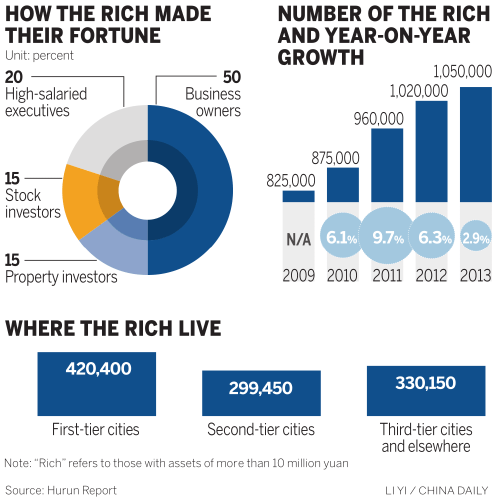
Hurun Research Institute last week released the GroupM Knowledge-Hurun Wealth Report 2013 that analyses China’s wealthy people broken down according to their regional distribution across China, as well as their investment, consumption preferences, and how they use the media.
This report will help marketers to better understand the lifestyle of China’s wealthy population and to communicate and engage with them more effectively.
The number of millionaires grew (defined as individuals with personal wealth of CNY 10 million, equivalent to US$1.6 million and GBP 1 million) by 3% in 2012 to 1.05 million, while the number of the super-rich (defined as individuals with personal wealth of CNY 100 million, equivalent to US$16 million and GBP 10 million) reached 64,500, up 2% from the previous year. The growth, the slowest one in five years, has decelerated for the second consecutive year.
As of the end of 2012, in all the 31 autonomous regions, cities and provinces excluding Hong Kong, Macau and Taiwan, the number of millionaires has increased by 30,000 from last year to 1.05 million, while the number of the super-rich has increased by 1,000 to 64,500 – an increase of 3% and 2% respectively. The growth, the slowest one in five years, has decelerated for the second consecutive year. At present, one out of every 1,300 people in China is a millionaire, and one out of every 20,000 people in China belongs to the super-rich class.
Beijing remains in the first place, followed by Guangdong and Shanghai. Tianjin saw the fastest growth rate in the country, while Zhejiang Province and Inner Mongolia dropped the most.
Beijing remains in the first place with an increase of 5,000 to 184,000 millionaires, and with an increase of 200 to 10,700 super rich. Guangdong ranks the second with 172,000 millionaires and 9,600 super rich. It is followed by Shanghai with 147,000 millionaires and 8,500 super rich. Tianjin rose to the tenth place, with 19,000 millionaires, up 11% from the previous year, as well as 1,400 super rich, up 12% from the previous year – the fastest increase in all the cities. Other fast-growing provinces include Shandong, Henan, Yunan, Guizhou, Qinghai and Tibet. About 60% of China’s wealthy population are located in the second and third tier cities such as Hangzhou, Ningbo and Foshan where the number of millionaires exceed 20,000. The research indicates that, although the number of China’s millionaires is growing generally, the number of some areas decreased slightly among which Zhejiang Province and Inner Mongolia dropped the most.
A quarter of millionaires say they are very confident about China’s economy in the coming two years, a decline of 3% from the previous year. The confidence level of the year before was 54%. 66% of the millionaires say they are fairly confident – a 2 percentage point increases from a year earlier, while 9% of millionaires say they are not confident – a 2 percentage point increase from a year earlier and this is the highest one in last three years.
The Hurun Millionaires’ Happiness Index has reached 7.8 out of 10. What millionaires want most of all is to have good health. A quarter are dissatisfied with their state of health.
73% of millionaires think they are happier than the previous generation; the happiness they get from their family is greater than that from their jobs; female millionaires’ happiness index has reached 8, slightly higher than that for men; the under 30s’ sense of happiness is notably lower than that of older people, particularly where their work is concerned.
Other interesting findings include:
- There are currently 8,100 Renminbi billionaires and 280 individuals with personal assets of 10 billion RMB in China.
- China’s millionaires fall into four categories: private business owners, stock market gurus, property speculators and high-salaried executives, in which the number of stock market guru dropped by 5% from the previous year, and the number of high-salaried executives grew by 5% from the previous year. The Chinese super-rich fall into three categories: private business owners, stock market gurus, and property speculators.
- Real estate remains the first choice when it comes to personal investment in spite of the macro-adjustment measures, accounting for 64% of all investments. However, a certain proportion of Chinese millionaires also start seeking new investment opportunities.
- The wealthy population spent 3% of their average wealth of 59 million RMB last year. A great 3% of their spending went to travel. Wealthy people are also more and more interested in seeking out unique travel experiences, and exotic destinations such as Africa or the polar areas are gaining popularity
- On average, millionaires and the super-rich are away on business trips for fewer days a month than last year, a slight reduction of half a day and 3 days respectively. On average, millionaires leave China 2.8 times a year, down from 3 times last year and the super-rich leave China 3.4 times a year, down from 4.2 times last year.
- Following the craze for studying abroad, there is now also an increasingly clear tendency to purchase overseas property. The U.S. is the top destination for overseas property purchase.
- About 80% of wealthy people now use WeChat than using microblogs (70%), most of whom use it primarily for interacting with their friends.